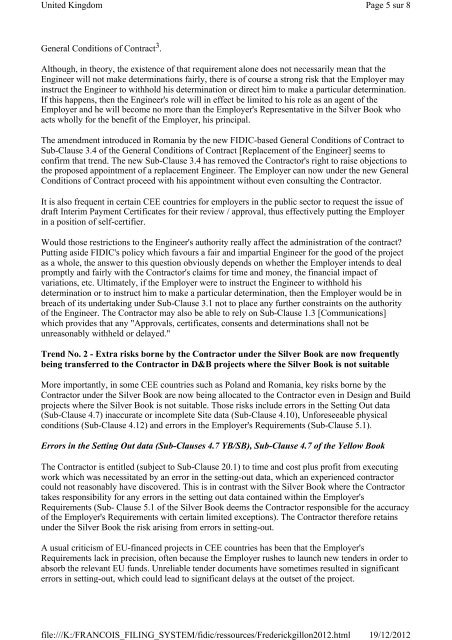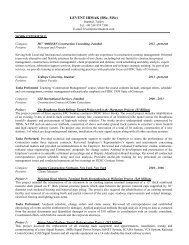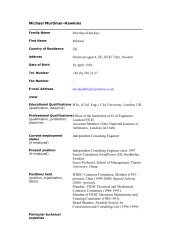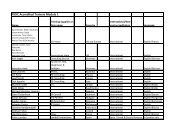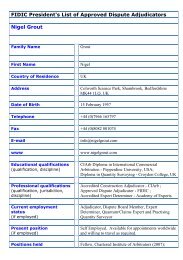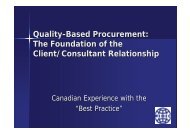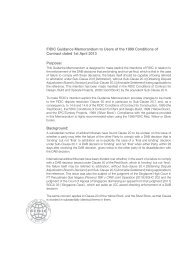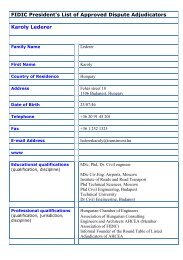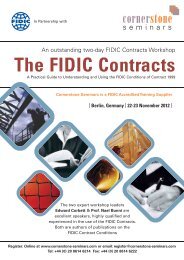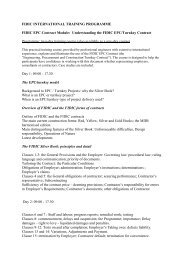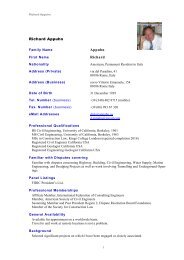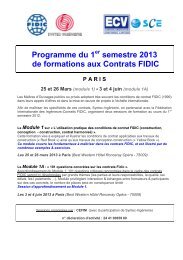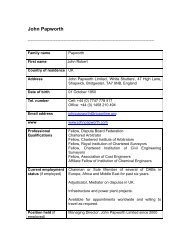United Kingdom: Use And Misuse Of FIDIC Forms Of Contract In ...
United Kingdom: Use And Misuse Of FIDIC Forms Of Contract In ...
United Kingdom: Use And Misuse Of FIDIC Forms Of Contract In ...
Create successful ePaper yourself
Turn your PDF publications into a flip-book with our unique Google optimized e-Paper software.
<strong>United</strong> <strong>Kingdom</strong>file:///K:/FRANCOIS_FILING_SYSTEM/fidic/ressources/Frederickgillon2012.htmlPage 5 sur 819/12/2012General Conditions of <strong>Contract</strong> 3 .Although, in theory, the existence of that requirement alone does not necessarily mean that theEngineer will not make determinations fairly, there is of course a strong risk that the Employer mayinstruct the Engineer to withhold his determination or direct him to make a particular determination.If this happens, then the Engineer's role will in effect be limited to his role as an agent of theEmployer and he will become no more than the Employer's Representative in the Silver Book whoacts wholly for the benefit of the Employer, his principal.The amendment introduced in Romania by the new <strong>FIDIC</strong>-based General Conditions of <strong>Contract</strong> toSub-Clause 3.4 of the General Conditions of <strong>Contract</strong> [Replacement of the Engineer] seems toconfirm that trend. The new Sub-Clause 3.4 has removed the <strong>Contract</strong>or's right to raise objections tothe proposed appointment of a replacement Engineer. The Employer can now under the new GeneralConditions of <strong>Contract</strong> proceed with his appointment without even consulting the <strong>Contract</strong>or.It is also frequent in certain CEE countries for employers in the public sector to request the issue ofdraft <strong>In</strong>terim Payment Certificates for their review / approval, thus effectively putting the Employerin a position of self-certifier.Would those restrictions to the Engineer's authority really affect the administration of the contract?Putting aside <strong>FIDIC</strong>'s policy which favours a fair and impartial Engineer for the good of the projectas a whole, the answer to this question obviously depends on whether the Employer intends to dealpromptly and fairly with the <strong>Contract</strong>or's claims for time and money, the financial impact ofvariations, etc. Ultimately, if the Employer were to instruct the Engineer to withhold hisdetermination or to instruct him to make a particular determination, then the Employer would be inbreach of its undertaking under Sub-Clause 3.1 not to place any further constraints on the authorityof the Engineer. The <strong>Contract</strong>or may also be able to rely on Sub-Clause 1.3 [Communications]which provides that any "Approvals, certificates, consents and determinations shall not beunreasonably withheld or delayed."Trend No. 2 - Extra risks borne by the <strong>Contract</strong>or under the Silver Book are now frequentlybeing transferred to the <strong>Contract</strong>or in D&B projects where the Silver Book is not suitableMore importantly, in some CEE countries such as Poland and Romania, key risks borne by the<strong>Contract</strong>or under the Silver Book are now being allocated to the <strong>Contract</strong>or even in Design and Buildprojects where the Silver Book is not suitable. Those risks include errors in the Setting Out data(Sub-Clause 4.7) inaccurate or incomplete Site data (Sub-Clause 4.10), Unforeseeable physicalconditions (Sub-Clause 4.12) and errors in the Employer's Requirements (Sub-Clause 5.1).Errors in the Setting Out data (Sub-Clauses 4.7 YB/SB), Sub-Clause 4.7 of the Yellow BookThe <strong>Contract</strong>or is entitled (subject to Sub-Clause 20.1) to time and cost plus profit from executingwork which was necessitated by an error in the setting-out data, which an experienced contractorcould not reasonably have discovered. This is in contrast with the Silver Book where the <strong>Contract</strong>ortakes responsibility for any errors in the setting out data contained within the Employer'sRequirements (Sub- Clause 5.1 of the Silver Book deems the <strong>Contract</strong>or responsible for the accuracyof the Employer's Requirements with certain limited exceptions). The <strong>Contract</strong>or therefore retainsunder the Silver Book the risk arising from errors in setting-out.A usual criticism of EU-financed projects in CEE countries has been that the Employer'sRequirements lack in precision, often because the Employer rushes to launch new tenders in order toabsorb the relevant EU funds. Unreliable tender documents have sometimes resulted in significanterrors in setting-out, which could lead to significant delays at the outset of the project.


